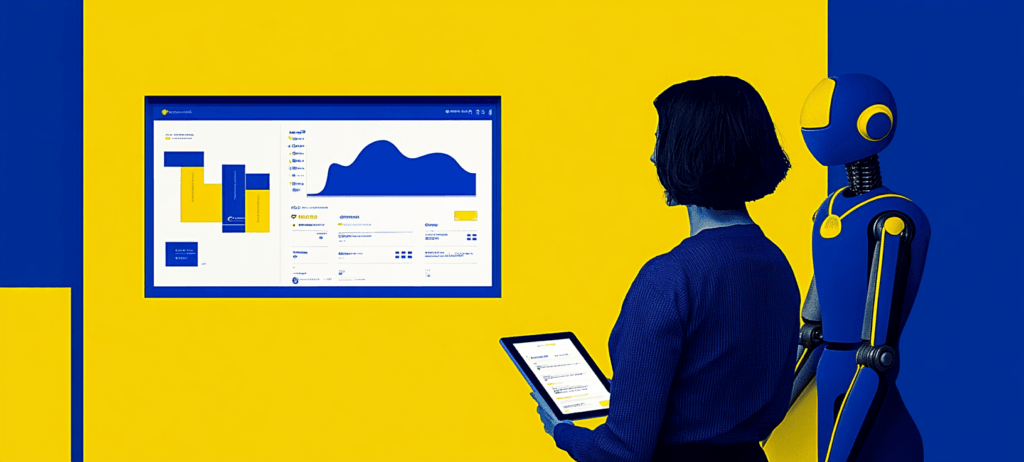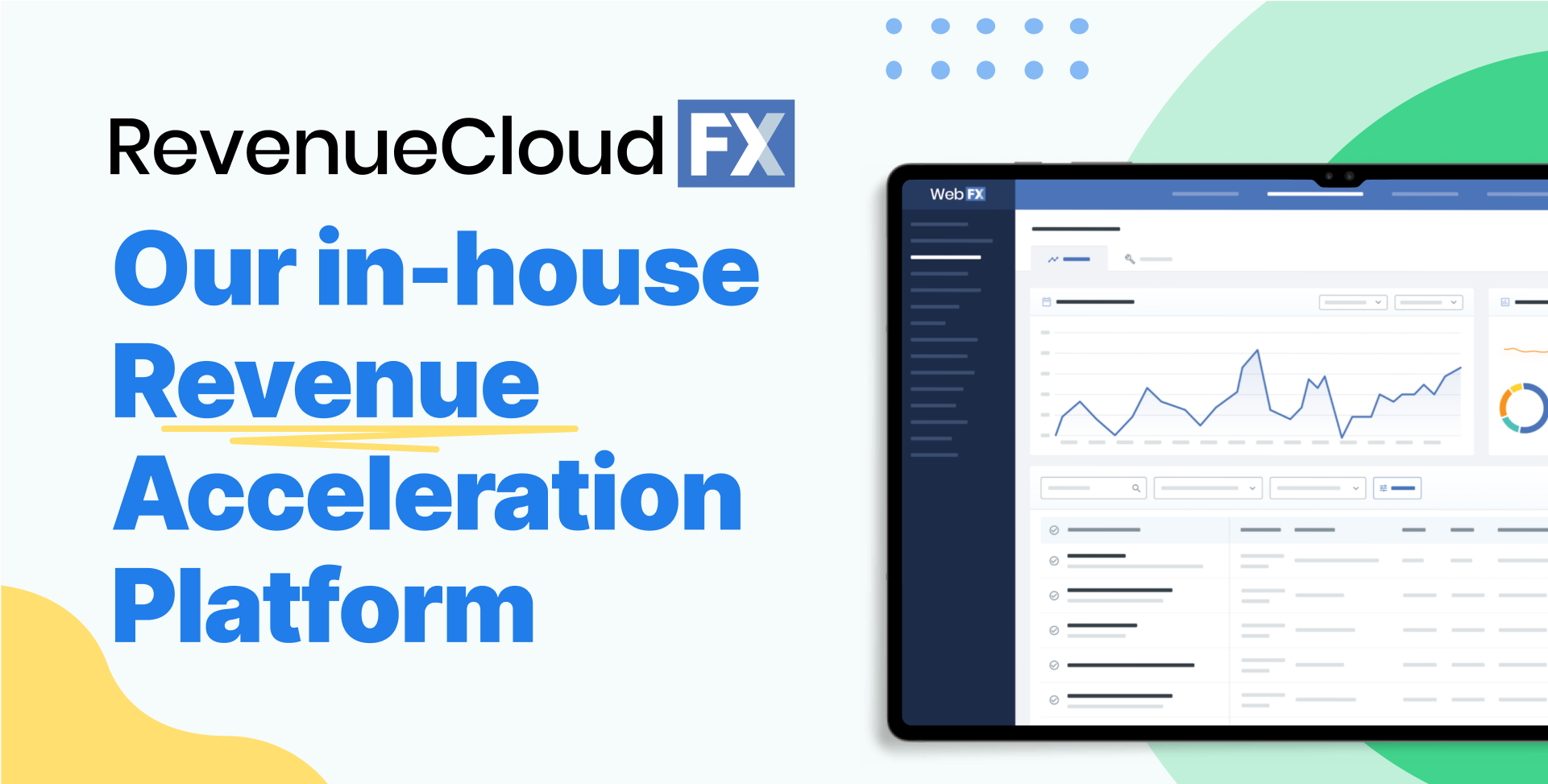-
 Published: Jun 25, 2025
Published: Jun 25, 2025
-
 9 min. read
9 min. read
-
Summarize in ChatGPT
-
 Maria Carpena
Maria Carpena Lead Emerging Trends & Research Writer
Lead Emerging Trends & Research Writer
- Maria is a Lead Emerging Trends & Research Writer at WebFX. With nearly two decades of experience in B2B and B2C publishing, marketing, and PR, she has authored hundreds of articles on digital marketing, AI, and SEO to help SMB marketers make informed strategic decisions. Maria has a degree in B.S. Development Communication major in Science Communication, and certifications in inbound marketing, content marketing, Google Analytics, and PR. When she’s not writing, you’ll find her playing with her dogs, running, swimming, or trying to love burpee broad jumps.
Table of Contents
- What is AI marketing automation?
- 4 benefits of AI marketing automation
- Improved marketing team efficiency
- Increased conversion rates and customer retention
- Improved campaign performance
- Increased return on investment (ROI)
- 5 ways to use AI in marketing automation
- 1. Lead scoring and nurturing
- 2. Marketing channel optimization
- 3. Personalization
- 4. Email automation
- 5. Predictive analytics
- How to implement an AI marketing automation strategy
- FAQs
- Carry out AI-powered marketing automation strategies with WebFX
- What’s the difference between AI and automation?
- What are the challenges of using AI in marketing automation?

Key takeaways
- AI marketing automation is the use of artificial intelligence (AI) technologies to automate, streamline, and optimize marketing strategies and processes.
- Some of the benefits of AI-powered marketing automation include improved marketing team efficiency, increased conversion rates, better campaign performance, and higher return on investment.
- Lead scoring, marketing channel optimization, hyper-personalization, email automation, and predictive analytics are some of the use cases of AI marketing automation.
In today’s AI-powered world, using mostly manual processes in your marketing just won’t cut it. That’s because the age of lightning-speed data processing and hyper-personalization is here.
How will you outpace your competitors? Enter AI marketing automation.
Responsible and ethical use of AI in your marketing automation processes can bring several benefits. Let’s get you started with how you can effectively implement an AI marketing automation strategy with these topics:
- What is AI marketing automation?
- 4 benefits of AI marketing automation
- 5 ways to use AI in marketing automation
- How to implement an AI marketing automation strategy
- FAQs
Feel free to jump into any topics you’re interested in. You can also subscribe to our free newsletter to get the latest tips about AI and marketing automation delivered straight to your inbox!
What is AI marketing automation?
AI marketing automation uses AI and machine learning algorithms to automate and optimize your marketing strategies and campaigns.
Using AI, you can process massive amounts of data and turn them into insights that will fuel your strategies. Meanwhile, marketing automation lets you streamline your marketing processes, making them more efficient.
With AI marketing automation, you create more efficient, effective, and personalized campaigns.
🎥 Video: How You Can Use Marketing Automation Tools for Business
4 benefits of AI marketing automation
AI-powered marketing automation provides these benefits:
- Improved marketing team efficiency
- Increased conversion rates and customer retention
- Improved campaign performance
- Increased return on investment (ROI)
Let’s go through each one:
Improved marketing team efficiency
AI marketing automation can streamline your processes. For one, it can offload the repetitive tasks from your marketing team members so that they can focus on other objectives.
For example, let’s say you own multiple automobile dealerships. AI-powered marketing automation can:
- Process a lead’s demographic and psychographic information: Instead of your marketing staff manually going through a lead’s information, AI can analyze demographics and psychographics, identifying the best dealership nearby.
- Score them according to their online and offline interactions with your business: Did a lead visit a particular product page multiple times in a month? AI can identify the vehicle models your lead has been eyeing.
- Assign them to the most suited sales rep in your team: Finally, once AI has processed a lead’s info, it can assign them to the sales rep who can most likely build rapport with them and close the sale.
Increased conversion rates and customer retention
AI-powered automation enables you to implement hyper-personalization. Hyper-personalization lets you personalize on a more granular level and process real-time data to provide a unique experience for each user.
For example, let’s say you’re in the business of pet products. You send out weekly newsletters to your subscribers.
To increase your newsletter’s open rate and click-through rate, you send out hyper-personalized newsletters based on their demographics, site behavior, and past purchases. With the help of AI marketing automation, you only send them relevant content, thus increasing customer satisfaction.
Improved campaign performance
AI can process data from various sources, enabling you to draw out insights and inform your marketing campaigns.
Which marketing channels are effectively driving high-quality leads? AI algorithms can help you answer this question and allocate more resources to these channels.
If you have marketing campaigns that deliver results below your expectations, AI can help you drill down through your data, uncover trends, and adjust your strategy.
You can also use AI and marketing automation to better understand your target audience through lead enrichment. Using AI to process your lead info, you can effectively nurture your leads to conversion.
Increased return on investment (ROI)
Because AI-powered marketing automation provides data-backed insights and a streamlined process, it can drive revenue growth and improve ROI. With the help of AI and marketing automation, you can identify new growth opportunities.
What makes your customers happy and satisfied with your business? AI-powered marketing automation enables you to find out, so you can increase customer retention, consequently growing your revenue. Fun fact: A 5% increase in customer retention can increase your revenue by as much as 90%!
5 ways to use AI in marketing automation
If you’d like to use AI for your marketing automation efforts and reap its benefits, here are five use cases. The table below summarizes the different ways you can use AI in marketing automation:
| Use case | How | Tools |
| 1. Lead scoring and nurturing | AI analyzes lead data in real time to score leads and effectively nurture them to conversion | Nutshell |
| 2. Marketing channel optimization | AI identifies your effective channels and automates optimization of your campaigns. | RevenueCloudFX |
| 3. Personalization | Segment your customers and leads by training AI algorithms to automatically analyze customer data and behaviors. | Mutiny, RevenueCloudFX, and SalesHandy. |
| 4. Email automation | AI lets you create flows that automate sending out emails and analyzing your campaign’s performance. | MailChimp and GetResponse |
| 5. Predictive analytics | AI spots emerging trends and customer needs, so you can create marketing campaigns that address these new pain points. | Microsoft Power BI and TeamAI |
1. Lead scoring and nurturing
Which among your leads are closer to purchase and must be prioritized? AI can quickly analyze lead data and aid you with lead scoring.
With marketing automation, you can create a flow that automates email nurturing campaigns. Automated lead nurturing can increase your conversion rates, because you guide your leads through the next stages of the sales pipeline until they ultimately convert.
AI tool for lead scoring and nurturing: AI-powered CRMs
Our user-friendly customer relationship management platform (CRM), Nutshell, can automate your personal outreach to prospects and leads. It also has AI agents that get context from your CRM data to effectively nurture your leads.
Nutshell has other automation features that guide your leads through your sales pipeline so you can close more deals!
2. Marketing channel optimization
Which among your marketing channels is driving revenue? Which ones are delivering revenue below your expectations? AI and marketing automation can identify your effective channels, where you can allocate more resources.
In addition, if you want to find out how you can optimize your campaigns per channel, use AI to sift through your data to discover emerging trends. You can then make data-backed decisions to improve your strategies.
If you need to nurture your leads across multiple channels, you can use AI and marketing automation tools to unify your data and perform omnichannel marketing.
AI tool for marketing channel optimization: RevenueCloudFX
Our IBM Watson-powered marketing platform, RevenueCloudFX, enables you to launch omnichannel marketing strategies. In addition, it automates marketing attribution and optimizes your ad spend.
RevenueCloudFX also discovers user journey trends, so you can pinpoint the customer touchpoints that drive leads to conversion and which touchpoints need optimization.
3. Personalization
If you have thousands of customers and thousands more prospects, it’s impossible to create personalized experiences for each one. With marketing automation and AI, personalizing customer experiences is a breeze.
You can segment your customers and leads by training AI algorithms to automatically analyze customer data and behaviors. You can then write personalized messages for each customer segment.
For example, let’s say you’re in the business of virtual fitness. You can personalize your homepage’s featured fitness program based on your site visitor’s interest. If they’re a new member on a free trial, their homepage looks different from an existing paying customer.
AI tools for personalization
Here are handy tools for personalization:
- Mutiny: Mutiny is an AI-powered website personalization tool that lets you create one-on-one outbound landing pages for your audience.
- RevenueCloudFX: Our proprietary platform can personalize website experiences, emails, and sales pitches (for B2B businesses).
- SalesHandy: SalesHandy is an email management tool that can personalize emails and follow-up messages.
4. Email automation
Just like personalization, sending out emails to your prospects and customers can take a significant amount of time and resources.
With AI and marketing automation, you can create flows that automate sending out welcome emails or cart abandonment emails. In addition, AI can also analyze your email campaign’s performance so you can optimize your next one.
Our AI-powered marketing growth platform, RevenueCloudFX, can automate lead-nurturing workflows so you can close more deals. It can also create target segments and analyze your email marketing performance.
AI tools for email automation
- Mailchimp: MailChimp is an email management and automation platform. Now powered with AI, it lets you personalize emails at scale.
- GetResponse: GetResponse is another email management tool powered by AI. It features an autoresponder, which automatically sends an optimized email to your subscribers when they perform an action.
5. Predictive analytics
Your customer’s needs evolve, and these shifts show through their behaviors and interactions with your business. Predictive analytics uses data to predict trends and events. With historical data, it forecasts potential scenarios that can guide you with your strategies.
Using AI for predictive analytics enables you to spot emerging trends and customer needs, so you can create marketing campaigns that address these new pain points.
AI tools for predictive analytics
- Microsoft Power BI: This is MIcrosoft’s business intelligence tool that uses machine learning to pull insights from various sources of data.
- TeamAI: TeamAI is a multimodal AI platform that gives you access to different AI models from OpenAI, Anthropic, and Google. Use it to draw out insights from your data and collaborate with your team by sharing prompts.
🎥 Watch: 6 Reasons Why You Need Marketing Analytics
How to implement an AI marketing automation strategy
It’s important to identify your goals before implementing an AI marketing automation strategy. What do you want to achieve with your AI marketing automation?
Do you need to streamline your marketing processes by automating certain parts? Or do you need to generate more leads and understand your target audience by processing customer data?
Once you’ve identified your goals, it’s time to:
- Identify the AI marketing automation tools that can help you achieve your goals.
- Create a plan detailing how you’ll integrate your AI marketing automation tools with your existing martech tools.
- Train your team members for AI marketing automation.
FAQs
Find answers to your questions related to using AI for marketing automation:
What’s the difference between AI and automation?
AI and automation are not one and the same, though these terms are typically used interchangeably. Let’s define each term, so you can identify which technology and tools your business needs.
AI is a technology that simulates human intelligence to perform tasks humans can do, such as analyzing your campaign’s results. Using algorithms and deep learning, AI can analyze and interpret large amounts of data, and draw insights from them without the help of a human.
Meanwhile, marketing automation is a technology that handles repetitive marketing tasks, such as sending emails, assigning leads, and scoring leads. It handles tasks that need human intervention.
What are the challenges of using AI in marketing automation?
While using AI in marketing automation comes with a host of benefits, it also has challenges. Marketing teams must prepare for them:
Data privacy
AI typically handles and analyzes massive amounts of customer data. Organizations using AI for marketing automation must ensure that they process, store, encrypt, and protect their customers’ data from breaches.
What businesses must do: Organizations must implement data privacy and security best practices. Some of the regulations surrounding data privacy — and you may need to comply with — are the following:
- General Data Protection Regulation (GDPR)
- California Consumer Privacy Act (CCPA)
- Health Insurance Portability and Accountability Act (HIPAA), which applies to healthcare organizations
Biases and inaccuracy
They say your output is only as good as your input. This applies to any AI-powered strategies. When you train your AI agents or systems with biased or inaccurate data, you’ll likely end up with flawed insights.
What businesses must do: Have good data hygiene. This means performing regular data cleansing, data audits, and standardized data entry.
Lack of human touch
While using AI for automation speeds up data processing and crafting marketing campaigns, automating your marketing efforts without human oversight will result in an impersonal approach.
What businesses must do: Organizations must not be lured into overly automating everything without humans getting involved. While AI tools’ capabilities have improved, they still cannot grasp nuances that only humans can.
Human creativity plays a vital role in impactful marketing strategies. Keep them in the loop.
Our digital marketing campaigns impact the metrics that improve your bottom line.
See Our Approach
$10 billion

24 million

7.14 million
Carry out AI-powered marketing automation strategies with WebFX
AI marketing automation can streamline your marketing processes and accelerate your business growth. If you need help creating an AI-powered automation strategy, consider teaming up with WebFX.
A full-service digital marketing agency with over 30 years of experience, WebFX has helped businesses in 200+ industries to generate over 24 million leads and $10 billion in revenue through our data-backed, AI-powered strategies.
Our proprietary software, RevenueCloudFX, offers a suite of tools that lets you personalize customer experiences, automate lead nurturing, and analyze your campaigns. RevenueCloudFX can drive up to 20% increase in ROI.
Grow your business with us. Contact us online or call us at 888-601-5359 to speak with a strategist about our AI services!
-
 Maria is a Lead Emerging Trends & Research Writer at WebFX. With nearly two decades of experience in B2B and B2C publishing, marketing, and PR, she has authored hundreds of articles on digital marketing, AI, and SEO to help SMB marketers make informed strategic decisions. Maria has a degree in B.S. Development Communication major in Science Communication, and certifications in inbound marketing, content marketing, Google Analytics, and PR. When she’s not writing, you’ll find her playing with her dogs, running, swimming, or trying to love burpee broad jumps.
Maria is a Lead Emerging Trends & Research Writer at WebFX. With nearly two decades of experience in B2B and B2C publishing, marketing, and PR, she has authored hundreds of articles on digital marketing, AI, and SEO to help SMB marketers make informed strategic decisions. Maria has a degree in B.S. Development Communication major in Science Communication, and certifications in inbound marketing, content marketing, Google Analytics, and PR. When she’s not writing, you’ll find her playing with her dogs, running, swimming, or trying to love burpee broad jumps. -

WebFX is a full-service marketing agency with 1,100+ client reviews and a 4.9-star rating on Clutch! Find out how our expert team and revenue-accelerating tech can drive results for you! Learn more
Try our free Marketing Calculator
Craft a tailored online marketing strategy! Utilize our free Internet marketing calculator for a custom plan based on your location, reach, timeframe, and budget.
Plan Your Marketing Budget
Table of Contents
- What is AI marketing automation?
- 4 benefits of AI marketing automation
- Improved marketing team efficiency
- Increased conversion rates and customer retention
- Improved campaign performance
- Increased return on investment (ROI)
- 5 ways to use AI in marketing automation
- 1. Lead scoring and nurturing
- 2. Marketing channel optimization
- 3. Personalization
- 4. Email automation
- 5. Predictive analytics
- How to implement an AI marketing automation strategy
- FAQs
- Carry out AI-powered marketing automation strategies with WebFX
- What’s the difference between AI and automation?
- What are the challenges of using AI in marketing automation?

See AI Marketing in Action
Explore how WebFX helped a regional brand get discovered in AI search experiences — proving what’s possible with today’s AI-driven marketing!

Proven Marketing Strategies
Try our free Marketing Calculator
Craft a tailored online marketing strategy! Utilize our free Internet marketing calculator for a custom plan based on your location, reach, timeframe, and budget.
Plan Your Marketing Budget
What to read next





